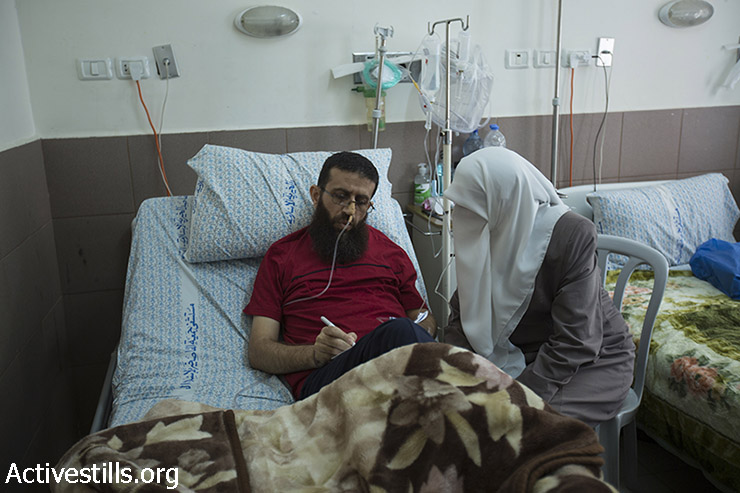A new bill that paves the way for putting Israeli citizens in administrative detention could one day affect activists, human rights workers, and Palestinian citizens of Israel.
By Sawsan Khalife’
A week after the Shin Bet recommended that Defense Minister Moshe Ya’alon sign off on administrative detention for two Jewish Israelis following the attack in the Palestinian village of Duma, he also recommended the Knesset pass an “anti-terrorism bill.”
The bill, which has been sitting on the shelf of the Knesset’s Constitution, Law and Justice Committee, authorizes the defense minister to use administrative detention without the standard prerequisite of declaring a “state of emergency” (which has been in place, essentially, since Israel’s founding). The law refers specifically to the administrative detention of Israeli civilians, since Palestinians in the occupied territories already live under a military regime.
The law will allow the court 48 hours to review the confidential evidence at hand, while the suspect will be denied the right to know the charges against him or her. Then the court will decide whether it approves or rejects an administrative detention order of up to six months, with the possibility for extension.
Different versions of this law have been discussed over the past several years in the Constitution, Law and Justice Committee. Until the dissolution of the last Knesset in December, a number of discussions on the bill dealt only with the question of defining a “terrorist act.” According to the bill, a terrorist act is carried out of political, ideological, religious, or racist motivations. It is also an act that intends to inspire fear among the public in order to place pressure on the government to act or cease acting a certain way.
This general definition can easily be used as a means of blocking any type of struggle against government policy, social or otherwise. The use of administrative detention against settlers is a slippery slope, which could one day affect social activists, human rights workers, and Palestinian citizens of Israel.
Administrative detention is a violation of basic human rights. It is the detention of a person for an undefined period, which denies them the right to trial, knowledge of the charges or even hearing the evidence presented against them (if there was satisfactory evidence, the suspect would have formally been brought to trial).
There are approximately 400 Palestinians currently in administrative detention. Approximately 400 Palestinians are sitting in Israeli prisons without trial or release date. That is, until the attack on Duma. Following the fire-bombing of the Dawabshe house, a number of Israeli Jews have joined those 400 Palestinians, under order by the defense minister and the attorney general. There are those who claim that the practice is more fair now that Ya’alon has placed a few settlers under administrative detention, who may or may not have any connection to the attack in Duma. Look, they say, Palestinians aren’t the only terrorists posing a threat to the security of the state — now Jews will be receiving similar treatment. What they really mean to say is: Israel is an egalitarian democracy, which violates human rights in an equal manner.
The superior status of the settlers in comparison to the Palestinians, however, will not disappear because five settlers are currently in administrative detention. This step doesn’t change a thing in the West Bank, rather it only constitutes a step toward violating civil rights, especially those of Palestinian citizens.
According to reports by human rights NGO Yesh Din, less than two percent of the attacks carried out by settlers against Palestinians have led to indictments or convictions. This statistic certainly does not deter settlers from carrying out further attacks. A week after the arson in Duma, another home in the village was attacked.
Prepared to die for a right to trial
Administrative detainees, along with human rights activists, have tried everything in their power to put an end to the practice — including turning to international institutions — to no avail. The struggle against administrative detention has led the leadership of Palestinian political prisoners to organize mass hunger strikes in the hope of putting pressure on the government. Some of the hunger strikes also included individuals who were not in administrative detention, but were tried in court and denied privileges such as family visitations, being allowed to walk in the outdoor yard, or other basic rights.
Administrative detainees starve themselves in order to demand that an indictment be filed against them and that they be given a fair trial, or be released. How absurd! A man is prepared to die for the right to a trial.

Palestinian attorney Muhammad Allan has been detained in prison since November of last year without rights or a trial. He has been on hunger strike for 60 days and has refused medical treatment. Just a month ago, another administrative detainee, Khader Adnan, was released after a similarly harrowing hunger strike.
Allan is backed by Israeli doctors who have refused to force-feed him, a practice that in the past has led to the deaths of four Palestinian prisoners in Israel. The doctors are under enormous pressure by the government, although they maintain that force-feeding constitutes a form of torture, according to medical ethics.
While administrative detention may cost Allan’s life, it will only cost settlers in administrative detention a few supportive or opposing claims by politicians. No one will be surprised when they are released without trial, without going on hunger strike or without anyone threatening them with force-feeding.
Sawsan Khalife’ is an independent journalist. This article was first published in Hebrew on Local Call. Read it here.


